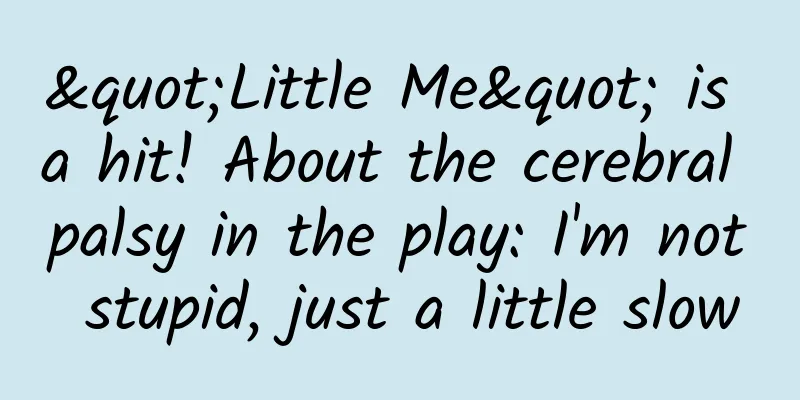"Little Me" is a hit! About the cerebral palsy in the play: I'm not stupid, just a little slow

|
Recently, the movie "Little Me" is being shown in theaters. The film focuses on a special group of people with cerebral palsy. With its sincere emotions and moving stories, it has become one of the most popular movies during the New Year's Day season. ▲Liu Chunhe played by Yi Yang Qianxi In the film, Yi Yang Qianxi plays Liu Chunhe, a cerebral palsy patient who has never given up his love and pursuit of life, but has suffered a lot of loneliness and helplessness due to his limited mobility and unclear pronunciation. "Liu Chunhe is just cerebral palsy, not a fool." This line in the movie is also the voice of Fan Xiong, the prototype of Liu Chunhe. Recently, Xinhua News Agency New Media Center and the "Little Me" film team jointly launched a social name change initiative "Don't Call Me Cerebral Palsy". In order to find a common name that can vividly describe the disease and is easy for the public to understand to replace "cerebral palsy", the name change volunteer team proposed a series of names such as "cerebral palsy", "cerebral movement disorder", "Chow Yun-fat syndrome", "Li De syndrome", etc., and finally found the earliest description of the "five delays" symptoms of "cerebral palsy" by Qing Dynasty physician Zhang Lu in the ancient Chinese medical classic "Zhang's Medical Encyclopedia". Based on this inspiration, the name change team decided to replace "delay" with "slow" which is more suitable for modern communication, and refined the new nickname "five slow syndromes". "Five Slow Diseases", this new name is not a labeling definition, but a call for a deeper understanding and equal treatment of patients by the society. They are just a group of ordinary people who are a little slow. As long as one more person calls them "Five Slow Disease Patients", they will have one more fair chance. A name change may not be enough to completely correct the public's misunderstandings and prejudices in a short period of time, but it can be a starting point, an opportunity to guide people to re-understand the patient group. Where does cerebral palsy come from? Is there really something wrong with their intelligence? Is it possible to fully recover? How should we treat the "Liu Chunhe" in real life? 1. What is cerebral palsy? Cerebral palsy (CP), also known as CP, is a group of persistent central movement and posture development disorders and activity limitation syndromes caused by non-progressive damage to the developing fetal or infant brain, often accompanied by sensory, perceptual, cognitive, communication and behavioral disorders, as well as epilepsy and secondary muscle and skeletal problems. 2. How many people have cerebral palsy? There are more than 17 million people with cerebral palsy in the world. According to reports from home and abroad, the prevalence of cerebral palsy is 1.4-3.2‰, and the prevalence of cerebral palsy in children aged 1-6 in my country is 2.46‰. In China, there are about 6 million people with cerebral palsy. 3. Is cerebral palsy a fool? Cerebral palsy, also known as cerebral palsy, is a developmental disorder characterized by movement disorders. The movement disorders of cerebral palsy are often accompanied by sensory, perceptual, cognitive, communication and behavioral disorders, as well as epilepsy and secondary muscle and bone problems. In the film, although Liu Chunhe is physically limited, his intelligence and emotional world are extremely rich. Liu Chunhe's college entrance examination score is more than 80 points higher than the first-tier line, and his memory is also very good. This reflects an important feature of cerebral palsy patients: their intelligence level is not always proportional to the degree of motor impairment. Although some patients may have cognitive or intellectual disabilities, for the vast majority of patients, their cognitive and intellectual development levels are almost the same as normal people. Some children with cerebral palsy even have higher IQs than ordinary people. They need more attention and understanding from society. 4. Can cerebral palsy be completely cured? Generally speaking, the medical community recognizes that cerebral palsy is incurable , and there is no standard single treatment for cerebral palsy. Cerebral palsy requires multidisciplinary systematic treatment, and each treatment method can solve part of the problem, but it is difficult to solve all the problems of cerebral palsy patients. Sun Yongan, chief physician of the Department of Neurology at Peking University First Hospital, said in an interview with reporters that nerve damage is generally caused by congenital development or acquired damage. If cerebral palsy is caused by poor nerve development in the embryo, it is still difficult to completely cure it even if there is some growth compensation in the future. 5. What causes cerebral palsy? Prenatal factors Premature birth (especially extremely immature babies with gestational age < 28 weeks and birth weight less than 1000g), multiple pregnancy, intrauterine infection, fetal exposure to adverse environment (mother's alcoholism, smoking, drug abuse, exposure to radiation, poisons, high fever), etc. Intrapartum factors Maternal comorbidities and emergencies during labor, such as placental abruption, umbilical cord prolapse, and amniotic fluid embolism, may lead to fetal distress and neonatal asphyxia, thereby causing severe perinatal brain damage. Postpartum factors Brain damage and acute encephalopathy caused by diseases suffered by newborns after birth, such as central nervous system infection, hypoglycemic encephalopathy, bilirubin encephalopathy, and severe intracerebral hemorrhage. Developmental malformations When there are developmental malformations, especially structural malformations of the central nervous system, it may lead to abnormal delivery process and neonatal hypoxia and asphyxia. Genetic factors Studies in recent years have found that among some children with cerebral palsy, there is a tendency for the disease to be related and familial, that is, patients with cerebral palsy appear repeatedly in the same family. Source: Xinhua News Agency, People's Daily Online, Shanghai Disabled Persons' Federation, Digital Beijing Science Center |
Recommend
Linnaeus, the father of biology, was a naming maniac and also a dragon slayer.
May 23 is the birthday of Carl Linnaeus, the fath...
What are the main methods of Internet marketing and which ones are the most effective?
Nowadays, any company must do marketing and promo...
“Guide to Eating Out Safely” Series: Will your stomach agree to eating barbecue?
Although barbecue is delicious, it poses certain ...
Whoosh! Whoosh! Whoosh! How should spacecraft respond to micrometeoroids and space debris?
In December 2022, just as Russian astronauts Serg...
The knowledge and attitudes that senior marketing operations managers must possess!
People often say that marketing is the right brai...
Community SOP: From attracting new members to conversion and daily maintenance table
Nowadays, there are more and more group chats, bu...
Revealing the production method of Tik Tok hand-painted videos_Resource Headlines
As long as you watch Tik Tok, you will find video...
This year's Qixi marketing, big brands are doing it this way
It’s Chinese Valentine’s Day again! ! ! Such dog-...
A guide to co-branding marketing!
A short and fat yellow body, a flat mouth, and ha...
"Tianzhi-2D" satellite was launched, and the types of satellites are as follows
China Science and Technology News Network, Januar...
Analyzing Pinduoduo’s marketing strategy from the perspective of classic 4C
This article mainly analyzes Pinduoduo from the p...
How can an individual create a WeChat mini program? Earning a million dollars a year is not a dream
At present, few people have found the profit mode...
x Improve various leg shape training methods basic version
x Improve various leg shape training methods Basic...
Jidu and Hesai Technology reached a strategic cooperation
Jidu is a technology startup dedicated to creatin...
"Cancer comes from the mouth" is true! Research confirms that these 11 types of tumors are definitely related to "eating"
The word "cancer" has three characters....









